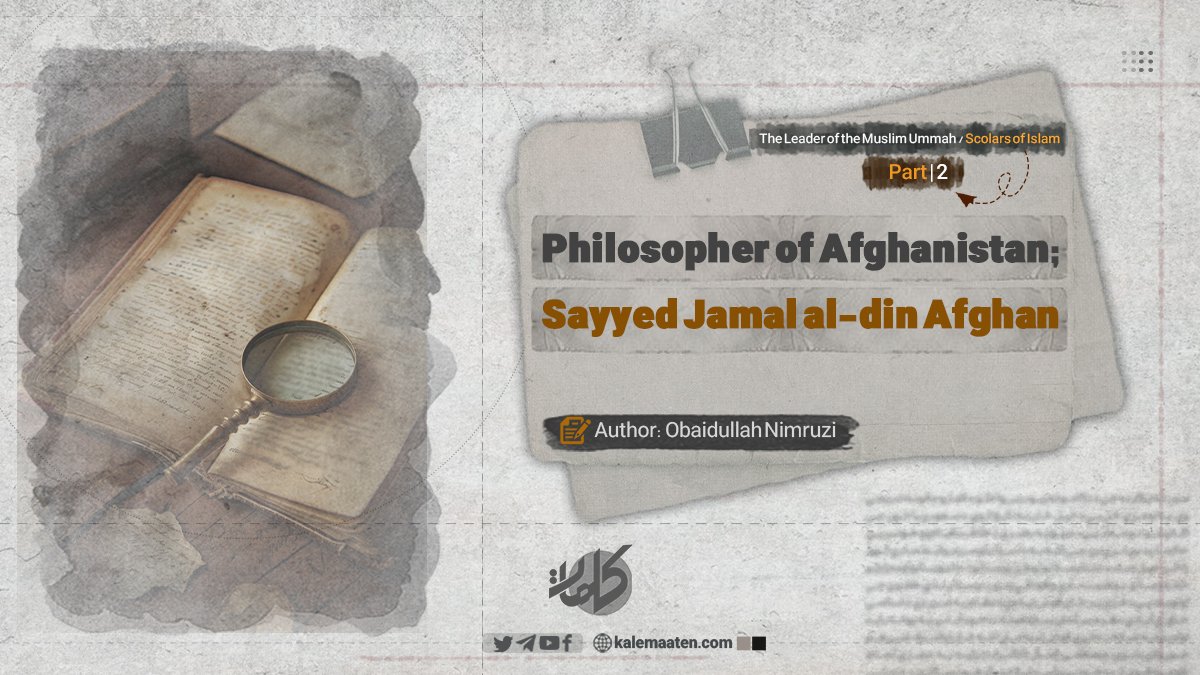
Author: Obaidullah Nimruzi
Philosopher of Afghanistan: Sayyed Jamal al-din Afghan (Part Two)
Key Concepts in the Thoughts of Sayyed Jamal al-din Afghan:
Throughout his life, Sayyed Jamal al-din Afghani consistently emphasized several fundamental points that can be considered the pillars of his ideology:
1. Islamic Unity:
Sayyed Jamal al-din was one of the first thinkers to seriously address the issue of Islamic unity and propose it as a solution to the problems of Muslim societies. He believed that only through unity could Muslims confront foreign colonizers and internal corruption. He viewed this unity as essential not only politically but also culturally and socially. In his opinion, Muslims should set aside sectarian and ethnic differences and work collectively to revive Islamic greatness.
2. Religious and Social Reforms:
Sayyed Jamal al-din understood that the decline of Muslims was due to their departure from the authentic principles of their religion. While he was fully committed to Islamic laws and principles, he believed that Muslim societies should abandon superstitions and incorrect beliefs and move toward rational and scientific thinking. He especially welcomed modern science and technology, advocating that Muslims should utilize the scientific achievements of the West and integrate them with Islamic teachings.
3. Resistance to Colonialism and Despotism:
As a staunch opponent of colonialism and despotism, Sayyed Jamal al-din sought to free Muslim societies from foreign domination and internal tyranny. He believed that only through political and social reforms and opposition to internal despotism could Muslims liberate themselves from colonizers. His political activities in Iran, India, Egypt, and other parts of the Islamic world made him one of the most prominent anti-colonial figures in modern history.
4. Acceptance of Modern Science and Technology:
Unlike many thinkers of his time, who completely distanced themselves from Western civilization, Sayyed Jamal al-din emphasized the acceptance of modern science and technology. He believed Muslims must improve their global standing by adopting new sciences. At the same time, he stressed the importance of preserving Islamic identity and held that science and religion were not inherently contradictory.
Political and Social Activities of Sayyed Jamal al-din:
During his numerous travels to various Islamic countries, Sayyed Jamal al-din consistently sought to awaken Muslims and guide them toward reformist and revivalist movements. In Iran, Egypt, India, and the Ottoman Empire, he connected with scholarly and political circles, striving to initiate anti-colonial and anti-despotism movements. The establishment of the journal Al-Urwah Al-Wuthqa was one of his greatest achievements, where he published his reformist ideas. This journal was widely distributed throughout the Islamic world and had a significant impact on shaping Muslim political and social thought.
Moreover, in his political struggles—especially in Iran—he played a key role in opposing the despotism of Naser al-Din Shah and supporting constitutionalists. He tirelessly worked to reform Iran’s social and political conditions and advocated for the establishment of governance based on law and justice.
Legacy and Global Impact of Sayyed Jamal al-din:
The ideas of Sayyed Jamal al-din Afghani have had a profound influence, not only during his lifetime but also in later periods. Many intellectual and political movements in the Islamic world, including nationalist and liberation movements in modern times, have drawn inspiration from his reformist ideas. As a pioneer of Muslim awakening, Sayyed Jamal al-din is remembered in modern history as a model of enlightenment, courage, and commitment to human and Islamic principles.
He was recognized not only in the Islamic world but also globally as a transnational thinker. His intellectual influence was evident in European scholarly and political circles, with many Western intellectuals paying attention to his views. Sayyed Jamal al-din’s ideas continue to inspire numerous scholars and social activists worldwide.
The above content serves as a prelude. The main topics and biographical details of Sayyed Jamal al-din Afghan will follow—Insha’Allah.
The mentioned points are preliminary claims, with forthcoming findings serving as evidence. This research aims to closely examine the life, ideas, and influences of Sayyed Jamal al-din Afghani, exploring the vast dimensions of his personality and his impact on the modern history of Islam and the world in general.
Continues…


